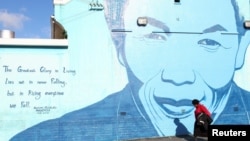Mandela, who spent 27 years in prison in his fight against racist white minority rule, is a hero to many in South Africa and across the world.
After he became the country’s first democratically elected president in 1994, there was a great sense of hope for the country under his leadership of the African National Congress party, or ANC.
But his successors — all from the ANC — have had mixed reviews, with one — former President Jacob Zuma — facing trial on multiple counts of corruption.
Isaac Rabotapi, a security guard in Johannesburg, says the country’s current leaders haven’t lived up to the legacy of the Mandela, affectionately referred to as "Tata," or father.
"I'm very disappointed," Rabotapi told VOA. "I think Tata would be crying to see that South Africa is collapsing. It’s collapsing (regarding) water, loadshedding, electricity, those stuffs, the shortage of food, you know, so many things (including) crime."
Like Rabotapi, beauty salon store owner Agnes Mashole, lamented the widespread power failures, known as loadshedding, which have badly affected Africa’s most developed economy.
“They failed, they like really failed. I wish we could just wake up Mandela and fix everything … The economy is going down. This loadshedding (is) worse,” she said.
Asanda Ngoasheng, an independent political analyst, told VOA South Africa was a complex country because of its history.
“Yes, corruption does leave a stain in the ANC and it is a difficult issue to deal with and it is disappointing for South Africans considering the legacy of Mandela, but there is a lot that the ANC has done for South Africa and continues to do for South Africa, particularly Black South Africans,” Ngoasheng said.
To mark Mandela Day, President Cyril Ramaphosa inaugurated two new statues of the revered statesman, and made a speech about "following in his footsteps."
South Africa will hold elections next year with recent polls showing the ANC might lose its parliamentary majority for the first time since coming to power.










Forum